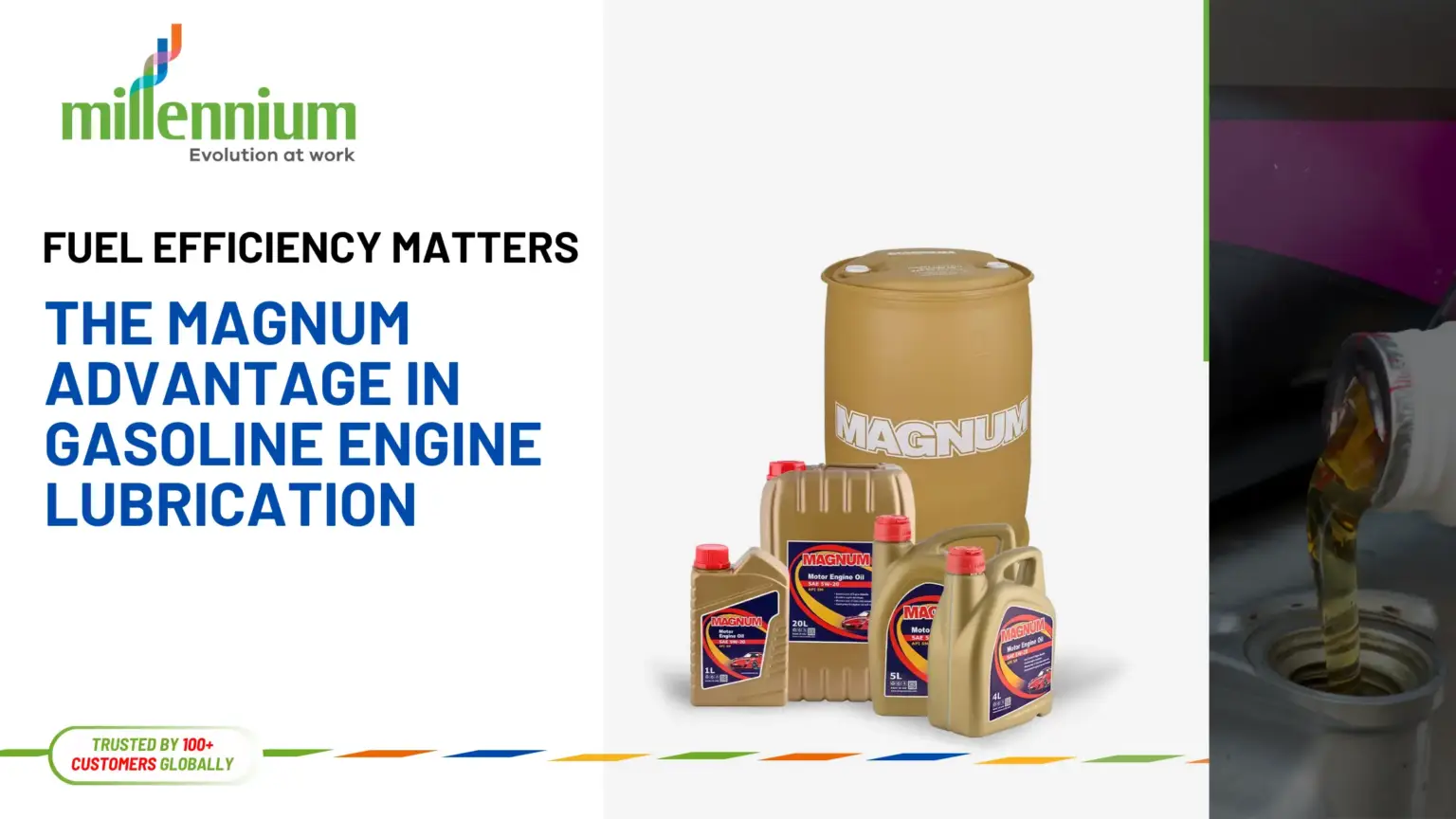Fuel Efficiency Matters: The Magnum Advantage in Gasoline Engine Lubrication
Fuel efficiency is one of the most critical factors for modern gasoline engines, directly impacting operational costs, environmental impact, and engine longevity. As engines evolve with more complex designs and tighter tolerances to meet stringent efficiency and emissions standards, the role of lubrication becomes even more essential. Quality engine oils like MAGNUM are not just a line of defense against wear and tear—they actively improve engine performance, reduce fuel consumption, and extend engine life.
In this article, we will explore how gasoline engine efficiency is maintained through the right choice of lubricants, particularly focusing on the benefits and advantages of MAGNUM oils in improving fuel efficiency and engine reliability.
Understanding Gasoline Engine Efficiency
Gasoline engine efficiency refers to how well an engine converts fuel into usable energy to propel a vehicle. Factors like combustion chamber design, fuel injection, air intake, and exhaust systems all influence how efficiently fuel is burned. However, friction between engine components, heat buildup, and contamination can reduce engine efficiency over time.
Friction is a major contributor to energy loss in gasoline engines. This friction occurs when metal parts, such as pistons, crankshafts, and camshafts, move at high speeds against each other. Over time, friction causes wear and tear on these parts, reduces engine performance, and increases fuel consumption as the engine works harder to overcome internal resistance.
This is where high-quality engine oils, such as MAGNUM, come into play. These oils are designed to reduce friction between moving parts, improving fuel efficiency while also protecting the engine from wear, corrosion, and heat damage.
Exploring the MAGNUM Advantage in Gasoline Engine Lubrication
MAGNUM oils are formulated with cutting-edge lubrication technology to meet the demands of modern gasoline engines. They are engineered to reduce friction, enhance engine cleanliness, and provide superior protection under high-temperature conditions. These features make MAGNUM oils particularly advantageous for improving fuel efficiency.
MAGNUM oils contain specially designed additives that minimize wear and help prevent the buildup of harmful deposits on engine components. By maintaining cleaner engine parts, MAGNUM oils ensure smoother operation and prevent the power-robbing effects of sludge and varnish, which can clog critical components like pistons and valve systems. This cleaner engine environment translates to better fuel combustion and overall engine efficiency.
Additionally, MAGNUM’s high thermal stability ensures that the oil maintains its viscosity and protective qualities under extreme conditions. Whether the engine is operating at high speeds, high loads, or in fluctuating temperatures, MAGNUM oils provide consistent protection and lubrication, preventing the degradation that can lead to increased fuel consumption and engine failure.
Benefits of Using MAGNUM Oils for Gasoline Engines
Using MAGNUM oils for gasoline engines offers a wide array of benefits, all of which contribute to enhanced engine performance and efficiency. Some key benefits include:
- Improved Fuel Efficiency: MAGNUM oils reduce friction between moving engine parts, which reduces the amount of energy wasted on overcoming friction. This results in better fuel economy, as the engine operates more smoothly and efficiently.
- Superior Engine Protection: MAGNUM oils contain anti-wear additives that form a protective layer on metal surfaces, reducing the wear caused by friction. This extends the life of critical engine components, helping to prevent costly repairs and replacements.
- Enhanced Engine Cleanliness: By preventing the formation of deposits, MAGNUM oils help keep the engine clean. Clean engines operate more efficiently, as buildup can restrict the flow of air and fuel, reducing performance.
- High-Temperature Stability: Gasoline engines can generate significant heat, especially under heavy loads or in hot climates. MAGNUM oils are formulated to withstand high temperatures without breaking down, ensuring that the engine remains protected even in demanding conditions.
- Reduced Emissions: By improving fuel combustion and reducing friction, MAGNUM oils help engines burn fuel more efficiently. This leads to lower carbon emissions, contributing to a cleaner environment.
- Extended Oil Change Intervals: Thanks to their superior formulation, MAGNUM oils maintain their protective properties over a longer period, meaning that users can extend the intervals between oil changes without sacrificing performance or engine protection.
Selecting the Right MAGNUM Oil for Your Engine
Choosing the right oil for your gasoline engine is critical for ensuring optimal performance. When selecting a MAGNUM oil, consider the following factors:
- Viscosity Grade: MAGNUM oils are available in a variety of viscosity grades (e.g., 5W-30, 10W-40), each suited to different engine types and operating conditions. The viscosity grade affects how the oil flows in different temperatures, so it’s essential to choose one that matches your engine’s requirements as outlined in the vehicle’s manual.
- API or ACEA Standards: Make sure that the oil meets the industry standards recommended by your engine manufacturer. MAGNUM oils meet or exceed many of these standards, ensuring compatibility and superior performance.
- Engine Type and Usage: Consider the type of gasoline engine you have and how the vehicle is used. High-performance engines may benefit from synthetic or semi-synthetic oils that offer enhanced protection and performance under extreme conditions, while everyday engines may only require conventional oil.
- Climate: In extreme climates, where temperatures can fluctuate dramatically, using a multi-grade MAGNUM oil that performs well in both cold-start conditions and at high operating temperatures is essential for maintaining engine efficiency.
Maintaining Gasoline Engine Efficiency
Maintaining engine efficiency involves more than just choosing the right gasoline engine oil—it requires regular maintenance. This includes timely oil changes, using the correct oil filters, and checking for any leaks or contamination in the engine.
Routine oil changes help remove contaminants like dirt, metal particles, and combustion byproducts that can accumulate in the oil over time. Using MAGNUM oils ensures that these contaminants are kept in suspension and removed during oil changes, preventing damage to engine components and ensuring consistent performance.
Engine oil levels should also be checked regularly, as low oil levels can result in inadequate lubrication, leading to increased wear and decreased fuel efficiency. Using high-quality MAGNUM oils provides peace of mind, knowing that your engine is well-protected against the rigors of everyday use.
MAGNUM Oils & Advantages of Gasoline Engine Lubricants
MAGNUM oils stand out as a top choice for gasoline engine lubrication due to their high-performance formulation and ability to enhance fuel efficiency. By reducing friction, protecting against high temperatures, and keeping engines clean, MAGNUM oils offer comprehensive benefits that ensure long-term engine reliability.
In conclusion, fuel efficiency matters greatly in gasoline engines, and choosing the right lubricant, like MAGNUM oils, is an essential part of maintaining and improving that efficiency. By selecting the right MAGNUM oil for your engine and following proper maintenance practices, you can maximize engine performance, reduce fuel consumption, and extend the life of your engine while also benefiting from reduced emissions and operational costs.






